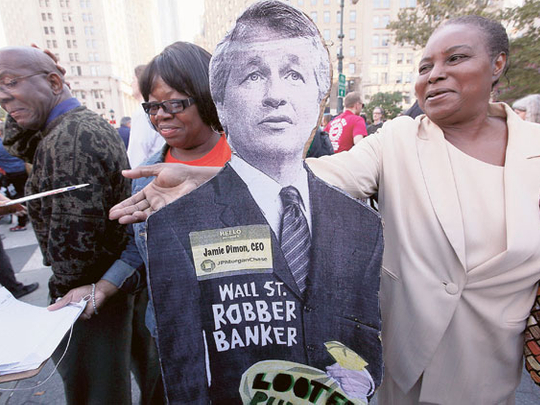
New York: Investors tiring of the Eurozone's debt crisis dragging the market all over the place are hoping to focus on something else this week — earnings.
But will third-quarter results be enough to drive the S&P 500 higher? Or will Europe's woes get in the way?
The unofficial start of earnings season begins on Tuesday, when Dow component Alcoa reports third-quarter results after the close of trading.
The earnings and guidance that may follow could give investors some clues on the health of the global economy, including any impact the Eurozone debt crisis has had and might continue to have on profits.But even if earnings paint a rosier picture than anticipated, stocks may face a stiff test in climbing much further, as analysts pointed to the declining 50-day moving average as a key resistance point that could limit gains. That level now sits around 1,178.
Improved hopes
Last week's sharp gains were built on improved hopes that European officials will get a handle on the Eurozone debt crisis. That fed a massive bout of short-covering as those betting against stocks were forced to buy shares to avoid losing money.
The benchmark S&P 500 index rose 2.1 per cent for the week, buoyed by a 6 per cent jump mid-week, as it appeared plans in the Eurozone to get a grip on the debt crisis were moving forward. The region remains a wild card, which could cause any gains to quickly vanish.
"For the next three weeks, in this country, earnings will be the focus and the subplot is going to be Europe. Europe is always going to be just under the surface," said Ken Polcari, managing director at ICAP Equities in New York.
"But if all of a sudden in the middle of the week, some catastrophe happens in Europe, the focus is immediately going to be headline driven and goes back to Europe." Other companies expected to post quarterly results this week include PepsiCo, Google, JPMorgan Chase & Co and toy maker Mattel.
Clouding the picture for profits is the fact that many earnings estimates have been trimmed by analysts in light of the turmoil in Europe, a staggering global economy and other events which resulted in a more cautious forecast.
"You've got to remember what was going on in July with the debt-ceiling crisis, credit default — companies were not willing to go out on a limb and make any big expectations," said Marc Pado, US market strategist at Cantor Fitzgerald & Co.
"So they were conservative going in, and we have not seen a whole lot of downward revisions, which suggests companies are probably going to be able to make those numbers."
The economic calendar for this week includes the FOMC minutes from the two-day meeting in late September, along with import prices and retail sales for September, in addition to the preliminary reading on October consumer sentiment from the Thomson Reuters/University of Michigan surveys.
Economic data of late has been better than expected, helping to quell fears that the economy was headed for a double-dip recession. Once again, that leaves the Eurozone crisis as a potential landmine to disrupt a slow move higher.
Better rhetoric
"The reason we have lifted in the past week is the rhetoric has improved and we are seeing progress, not necessarily a plan, but you are getting countries to admit to the problem, and that is a step in the right direction — you have to seek help before you can get help," Pado said.
"That is all we really need in order to get beyond this, and start focusing on the future and focusing on our own data. We have plenty of data that suggests slow growth, but nothing that suggests waving the red flag like a crazy person saying, ‘How can you not see this?'"












